It's been a year since we wrote an article (Fish? It's best when it's NOT fresh. Revolutionary ageing techniques) in which we told about a new, interesting frontier of research in fine dining. A real revolution: the basic concept was that, at least for fine palates, the tastier turbot, the most memorable amberjack, the super yummy tuna would become not the "freshly caught" one, as usual, but the one aged two or three weeks, in the right conditions, a bit like with meat.
Australian chef Josh Niland had brought the attention to this with his book The Whole Fish Cookbook. We thus wondered if this field of research was brand new, and discovered that in fact the experiment was about looking at ancient techniques with new spectacles. This is what Luigi Pomata (The fish ageing method explained by Luigi Pomata) told us. We then talked with a maestro like Gianfranco Pascucci (Ageing fish? A technique worth trying); and we would have immediately called another maestro, Moreno Cedroni, hadn't we learnt from Niland himself that at La Madonnina del Pescatore they were starting some experiments in this direction, and so it was worth waiting for the results (intelligence is also globalised. The same stages of development in a sector bring similar ideas in all five continents, almost).
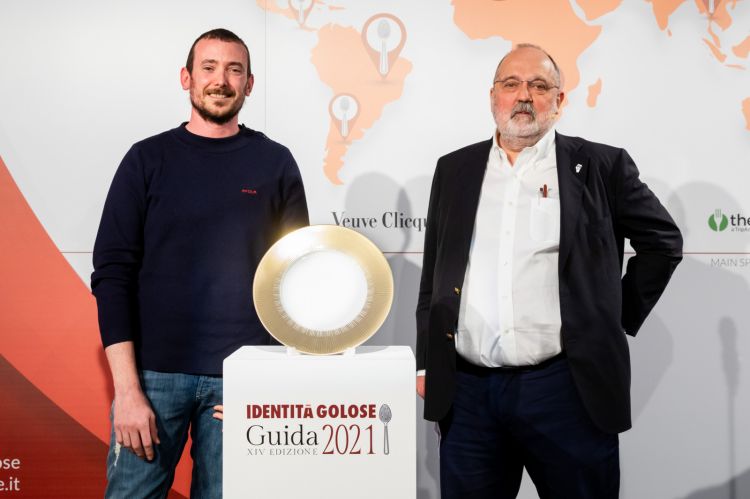
Luca Abbadir with Paolo Marchi a few weeks ago at Identità Golose Milano when he received the "Experiments in the kitchen" award from the Guida Identità Golose 2021
We now go back to this series for two reasons: Cedroni's experiments have reached, a few days ago, a crucial stage; and 24 hours before that stage the Guida Identità Golose 2021 awarded Luca Abbadir, right arm of the chef in Senigallia, the "Experiment in the kitchen" award. The cherry on the pie.
The premise was long and dutiful but let's get to the point. It all started in the Tunnel, La Madonnina's research lab. Abbadir explains: «We have a lyophilizing machine, a rotavapor, a pot that works both with pressure and with infrared rays (it speeds fermentations. For instance, you usually need 30-35 days at 55°C to make fermented garlic, this way we only need 6 hours), a magnetic emulsifier, an ultrasound tank, an ultrasound hand blender, two refrigerators with controlled humidity to age the meat, a refrigerator at 20°C for fermentations...». And now there's a new «refrigerator with controlled humidity and ozone to age the fish». Lupus in fabula.
Cedroni-Abbadir's tests with ageing fish stared around one year ago, with turbot: «It started when we asked ourselves: why do so many people age meat for months, and very few people age fish?». Hence the first attempts with turbot: «We saw that, by controlling temperature and humidity, for some ten days, it dries up and looses a great part of its liquid. At the end of the process it has an almost "meaty" texture, completely new, with a surprising consistency».
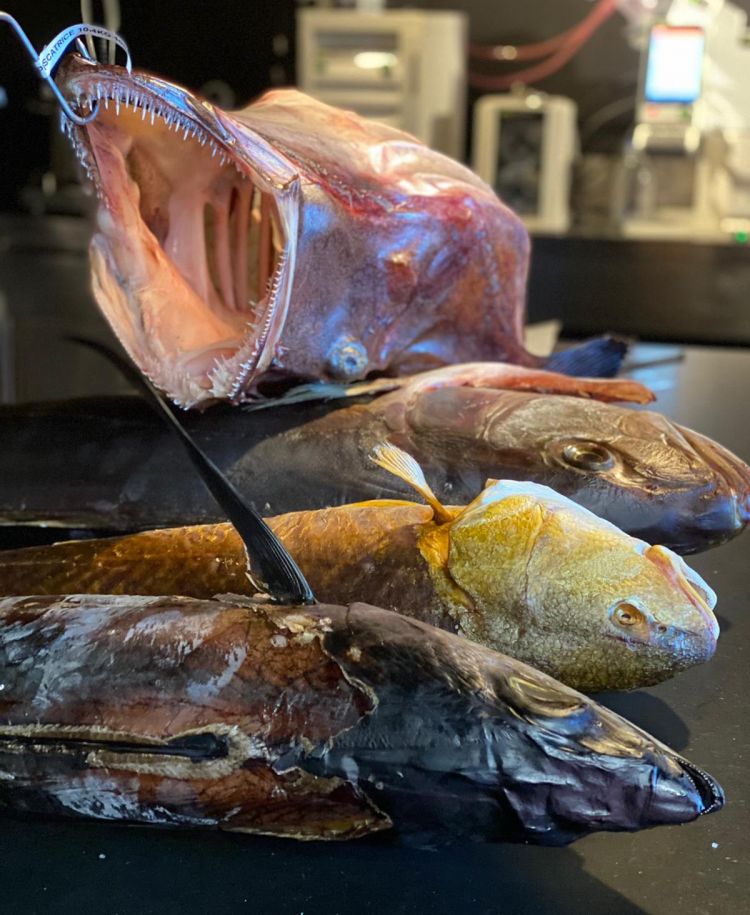
This was only the beginning: «This year we continued the research, buying a special refrigerator where you can always control humidity and temperature, plus it uses ozone, which slows down the decomposing and the withering of the meat». In other words, it makes it possible to make extreme experiments, to fully understand parameters and limits, «and guarantees that the fish is healthy. It dries it up without letting it rot», in other words. While with a normal refrigerator you can't have such a long ageing - it can stand 8 days maximum - with this machine we can go much further.
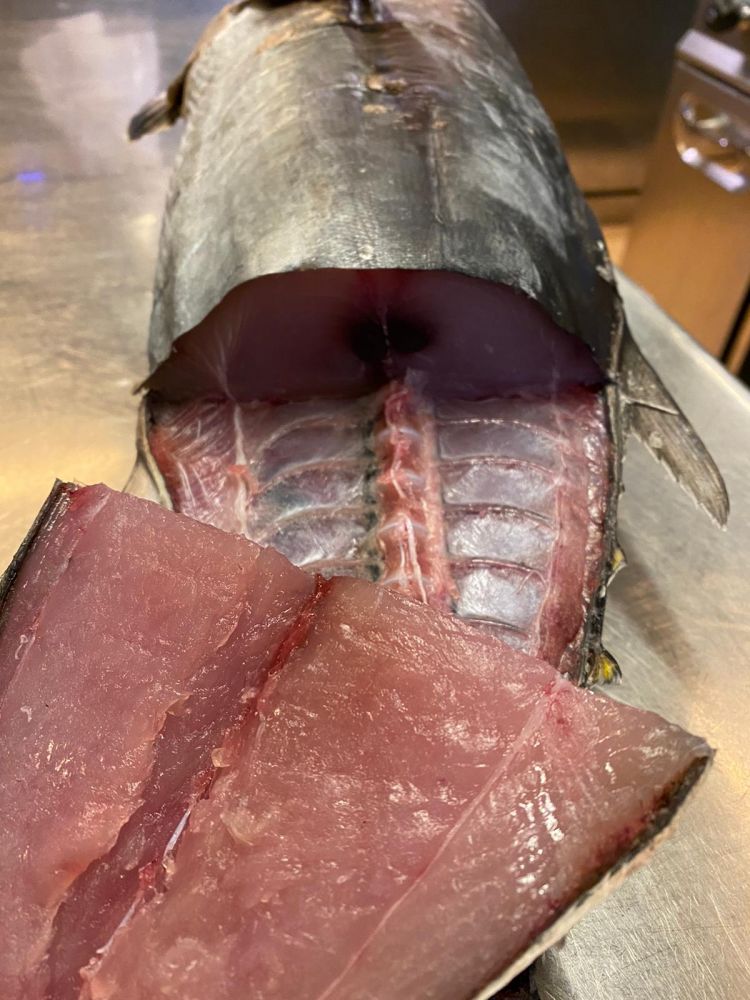
White tuna aged at La Madonnina
A few weeks ago, as we mentioned,
Cedroni and
Abbadir first tasted an amberjack aged in a refrigerator with ozone for 25 days. The result? «An unexpected concentration of flavours and sapidity. The consistency was much different from that of fresh amberjack. The meat is elastic as it has lost lots of water. And the marine flavour is stronger». Very interesting.
Abbadir also makes a very interesting and straightforward comparison with meat: «We basically applied a technique which, as a concept, like many people, we had already known for years. Take pigeons aged in koji, fermented rice. This feeds on the fibres and thus breaks and softens the texture. We've applied this idea to fish», at first with turbot, as we've seen. Now the evolution with the hyper-tech room.
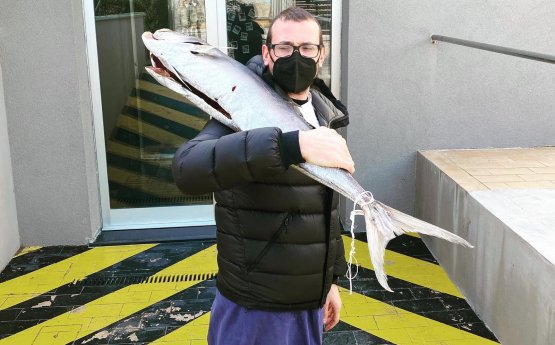
Abbadir at work ageing the fish
These days Abbadir follows the evolution of a 12-kilo white tuna, of a 15-kilo monkfish, an 8-kilo corba from Gargano and a 15-kilo amberjack. They are all "heavy weights" («The fish must be large. And very fresh at first») because, as already noticed with Niland's work, this technique doesn't go well with smaller fish, «the ageing dries the fibres a lot. Even with larger-sized fish, the external parts, like the tail, become as hard as wood». In other words, it's a process to be followed under specific circumstances.
Our article aims to have an educational scope as well. So what are the limits that they've noticed at La Madonnina during the experiment? «We must still define an "internal protocol" to understand how to serve guests the aged fish. We're still not sure that this process – that is to say ageing with ozone – kills anisakis». A premise: at La Madonnina they have a rule of buying very fresh fish, chill it to eliminate any issue with anisakis, and then defreeze it and serve it «after drying it with some kitchen paper, because fish always releases a lot of water». The ageing in the refrigerator eliminates this issue: the amberjack that has aged for 25 days goes from 25 kg to 23, so it loses 2 kg of water alone. It is "naturally" dried.
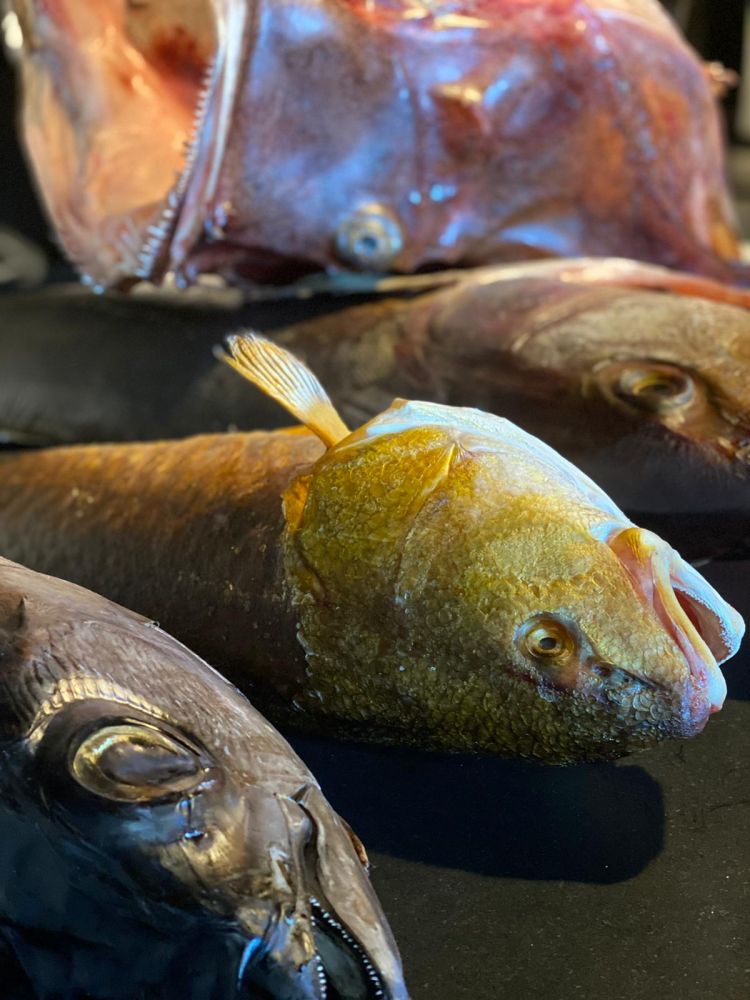
Fish aged at Luca Abbadir and Moreno Cedroni
Cedroni and Abbadir are obtaining the necessary responses to the above-mentioned questions: «Our work focuses on these aspects. We expect to finish our research in time for the spring opening». The idea is «to gradually explain to guests the goal of this technique». How so? «We would like to serve this aged fish without too many sauces, and "sides", perhaps only seasoned with olive oil, so that one can understand what it is, and the flavour that comes from the process». Which is extremely promising: «Take aged meat. It has some typical scents, which taken by itself can be unpleasant, and hint at the process, at the fat that was "subjected to the waiting": overall, instead, the flavour is very good but very special too. With aged fish the flavour instead is always excellent. Nothing is out of place. It seems like very fresh fish, but with scents that are even more concentrated».
At La Madonnina research continues: «We started the first tests with seafood salami: we've recently placed in the refrigerator a sort of turbot salami, without adding any additive, just salt and spices. We'll see how long it will age». The new frontier is also in Senigallia.
Translated into English by Slawka G. Scarso